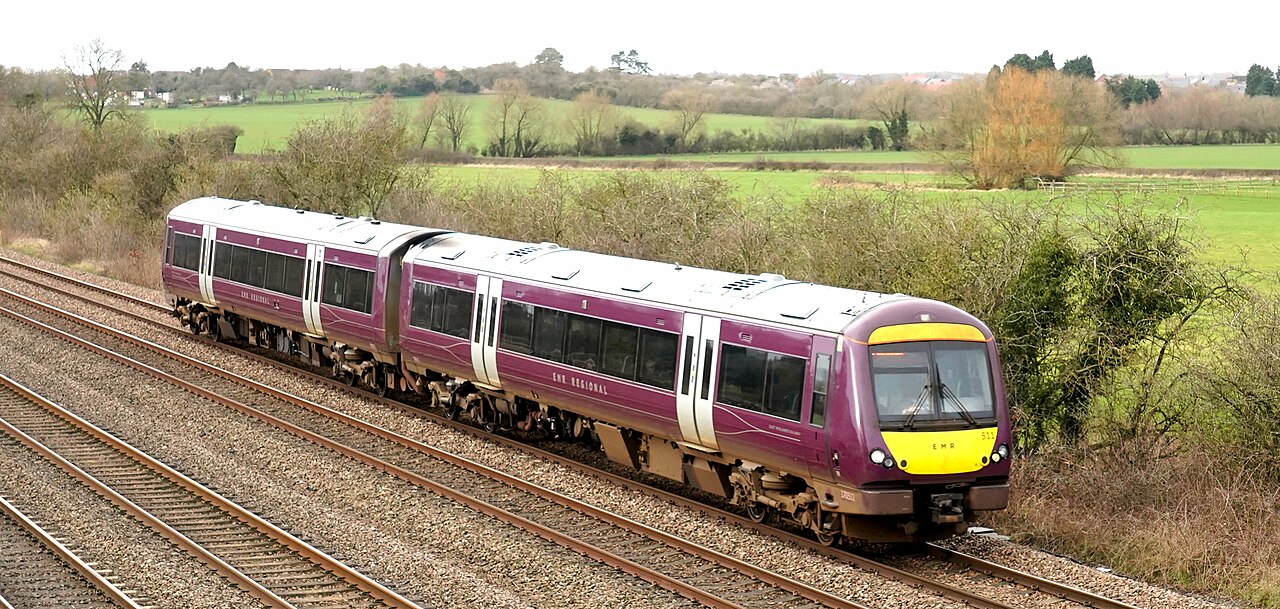- How does EMR Delay Repay work?
- How to claim EMR Delay Repay
- How much will I be compensated by EMR Delay Repay?
- Does EMR deliver on its Delay Repay promise?
- Why was my EMR Delay Repay claim declined?
- Should I get Delay Repay compensation or a Refund?
- Things to look out for when claiming Delay Repay with EMR
Under the National Rail Conditions of Travel, rail passengers have the right to compensation if their train journey is delayed beyond a specified time period. With EMR Delay Repay, you can get a partial or full refund on journeys that are delayed by at least 15 minutes. In this guide, we explain how EMR Delay Repay works and what to look out for when making a claim for an EMR refund.

Photo by kitmasterbloke
How does EMR Delay Repay work?
EMR Delay Repay is essentially a scheme that provides compensation to passengers on trains that arrive late to their destination. All train operators follow the Delay Repay rules as set out in their Passenger Charter, which means that operating companies are responsible for compensating travellers if their services are delayed or cancelled.
Whereas some operators only provide a refund for delays of 30 minutes or more, EMR compensates travellers for delays over 15 minutes. If your journey is disrupted, you can claim an EMR refund and receive a percentage of your ticket cost, depending on the exact length of the delay.
Passengers have up to 28 days after the date of travel to make an EMR Delay Repay claim, and these can be made for single, return or Season Tickets.
To work out the value of your refund, EMR looks at the time difference between scheduled arrival (on official timetables or pre-published, amended timetables when planned engineering works or holidays cause changes to train times) and real-life data on arrival times. The full amount of compensation paid varies based on the cost of your original ticket and the type of ticket you bought.
How to claim EMR Delay Repay
To make an EMR Delay Repay claim, simply log into the EMR website here and follow the instructions under 'Order process and refund applications' on the 'My account' screen.
This includes filling in all the key information about your journey, including the length of delay and ticket type, the date of travel, and how you would like to be reimbursed. Options for your refund are payment by BACS, credit or debit card, PayPal or a charity donation. EMR says that if none of these ways are suitable, you can contact the Customer Service Centre on 03457 125 678 to discuss alternative methods.
If you are a new customer with EMR, you will first be prompted to create an online account before you can proceed with your EMR Delay Repay claim.
Should you prefer to submit your claim via post, it is possible to download a paper form from EMR’s website or pick one up at an EMR station. This form can then be returned by freepost to the address on the form, along with all tickets and supporting documents.
If you have any questions or are unsure if you might be eligible for EMR Delay Repay, it is best to get in touch with EMR. You can also speak to a member of staff at an EMR help desk at any EMR station.
Note: all EMR Delay Repay claims are processed by EMR, not by Trip.com.
How much will I be compensated by EMR Delay Repay?
When making a Delay Repay claim with EMR, the amount you get back will depend on the length of your delay and your type of ticket:
| Length of Delay | Single tickets | Return tickets | Season tickets (% cost of a journey) |
| 15-29 minutes | 25% | 12.5% | 25% |
| 30-59 minutes | 50% | 25% | 50% |
| 60-119 minutes | 100% | 50% | 100% |
| Over 120 minutes | 100% | 100% | 200% |
For Season Ticket holders claiming EMR Delay Repay, the equation is a little more complicated. Essentially, you will be refunded the proportionate cost of one journey against the price of your Season Ticket:
- Weekly – 1/10th of the ticket cost
- Monthly – 1/40th of the ticket cost
- Annual – 1/464th of the ticket cost
For example, based on a weekly ticket for £100, if you are delayed by 15 to 29 minutes, you will receive £2.50 (i.e. 25% of one-tenth of the ticket price). If your train is more than two hours late, you would get £20 back (i.e. 200% of one-tenth of the ticket price).

Photo by Geof Sheppard
Does EMR deliver on its Delay Repay promise?
It is easy for frustrated passengers to feel sceptical about whether train operators actually deliver on their promise to refund delayed trains. To provide transparency, EMR publishes the number of claims received and percentage approved, as well as the total value compensated and the average time for the claim to be processed. Here are some examples; the full data set is available on the EMR Delay Repay website.
| Period | Volume of claims received | Number of claims approved | Total value of compensation paid per period | Average time for a claim to be processed (days) |
| 10/11-7/12/2024 | 49,999 | 35,984 | £707,782.67 | 4.12 |
| 13/10 - 09/11/2024 | 41,191 | 33,058 | £597,807.51 | 4.59 |
| 15/09 - 12/10/2024 | 32,045 | 24,531 | £418,263.33 | 4.41 |
From these stats, it is clear that EMR does pay out the majority of Delay Repay claims, and the average response time is under five days. So, on the whole, EMR does provide a reliable Delay Repay service.
Why was my EMR Delay Repay claim declined?
Not every EMR Delay Repay claim is successful, which could be because the journey claimed for was delayed by fewer than 15 minutes or because the applicant failed to provide all the right information needed to check.
Common issues include:
- Your claim was submitted more than 28 days after the journey was completed
- You didn’t provide sufficient proof of purchase to be able to verify the claim
- EMR was unable to find a delay of more than 15 minutes
- You provided tickets that were not valid for the journey you claimed
- Your delay was caused by an operator other than EMR
If you are still confused about whether you’re entitled to claim, or have any questions relating to EMR Delay Repay, feel free to reach out to the EMR Customer Support Team here.
Can I appeal an EMR Delay Repay decision?
If you are not satisfied with the outcome of your EMR Delay Repay claim and have checked that all the information you have provided was correct, it is possible to appeal the decision. To do so, log into your claim using the online portal, where you can check the status of any existing claims.
Use your claim reference and the email address associated with your claim to lodge your appeal. EMR will revisit your claim and get back in touch with a further decision.
Should I get Delay Repay compensation or a Refund?
EMR Delay Repay compensation is targeted towards those who travelled with EMR and faced a delay. Importantly, this means that, to claim EMR Delay Repay, you should have finished your journey. If you were forced to abandon your journey or were not able to start it, you will more likely need a full EMR refund, which must be claimed separately. Although Delay Repay offers refunds of up to 100%, a full refund is the right option if you did not travel.
Things to look out for when claiming Delay Repay with EMR
- Double-check the details! Any error in the dates or costs of your ticket could delay or deny your refund.
- When completing an EMR Delay Repay form, you need to give the details of the journey you booked, not the journey you ended up taking after the delay.
- Provide a high-resolution scan or photograph of your ticket(s) and passes, so that EMR can read and verify all relevant information.
- Check if there were planned engineering works on your day of travel because this could impact your ability to make a successful claim.
